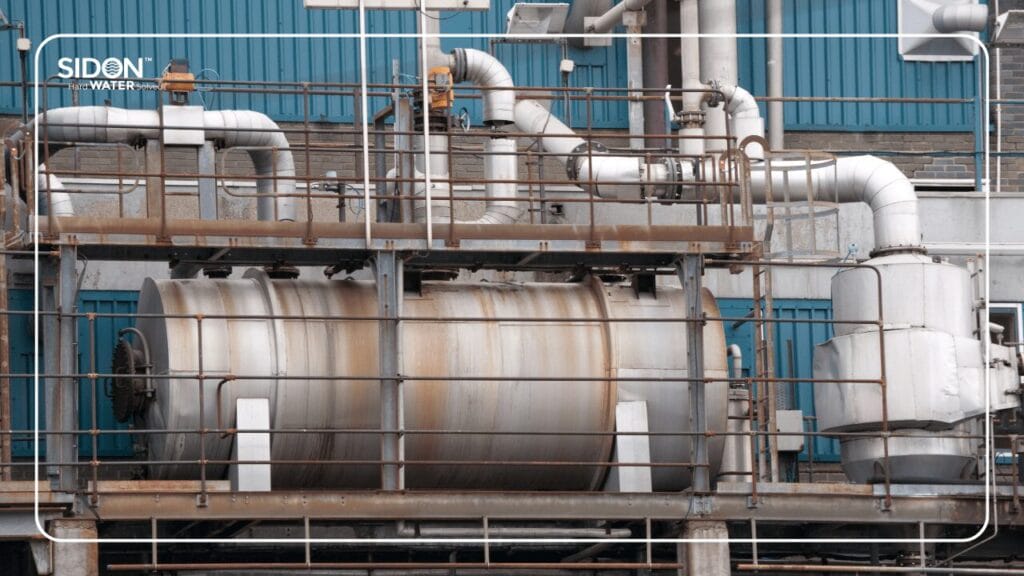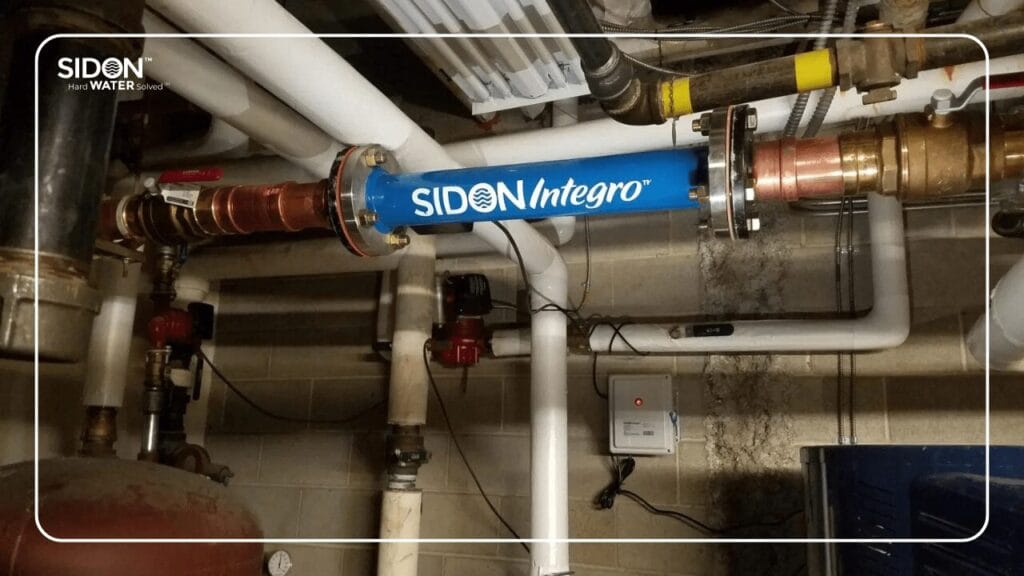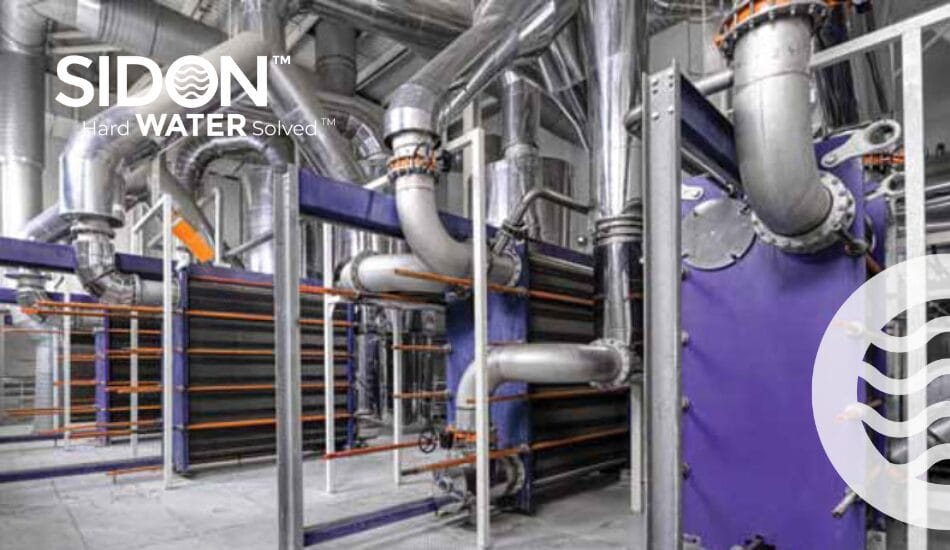Heat exchangers are critical components in many industrial processes, facilitating the transfer of heat between two or more fluids without mixing them. This efficient heat transfer is essential for the optimal operation of various systems, including HVAC units, power plants, and chemical processing facilities.
However, one common issue that compromises the efficiency of heat exchangers is the build-up of limescale due to hard water. In this blog, we will explore the cause, effect and possible solutions around this subject.
Heat Exchangers: Understanding Hard Water and Limescale Formation
Hard water contains high concentrations of dissolved minerals, primarily calcium and magnesium. When hard water flows through a heat exchanger, the increase in temperature causes these minerals to precipitate out of the solution and adhere to surfaces within the system, forming limescale. Limescale is a hard, chalky deposit that can accumulate over time, leading to significant operational challenges.
How Limescale Affects Heat Transfer
Limescale acts as an insulating layer on the surfaces of heat exchangers, inhibiting efficient heat transfer. This results in several adverse effects:
1. Reduced Efficiency: The insulating properties of limescale reduce the heat exchanger’s ability to transfer heat, leading to decreased efficiency. This inefficiency can cause the system to work harder to achieve the desired temperature, increasing energy consumption.
2. Increased Operational Costs: As the system works harder to compensate for the reduced heat transfer, energy costs rise. Additionally, more frequent maintenance and cleaning are required to manage limescale build-up, further increasing operational expenses.
3. Equipment Damage: Over time, the accumulation of limescale can lead to corrosion and damage to the heat exchanger’s components, resulting in costly repairs or replacements.
4. Decreased Lifespan: Persistent limescale build-up can shorten the lifespan of heat exchangers, necessitating earlier-than-expected replacements and increasing capital expenditures.
Given these challenges, preventing limescale build-up is crucial for maintaining the efficiency and longevity of heat exchangers.

Strategies for Preventing Limescale Build-Up
To mitigate the adverse effects of hard water on heat exchangers, several preventative strategies can be employed:
1. Water Softening
One of the most effective methods for preventing limescale formation is water softening. This process involves removing calcium and magnesium ions from the water, often through ion exchange. In ion exchange systems, hard water passes through a resin bed that exchanges calcium and magnesium ions for sodium or potassium ions, resulting in softened water. Softened water is less likely to precipitate minerals, thereby reducing limescale build-up.
When operating effectively a softener will prevent future build-up of limescale. The drawback to water softening is that they are unable to remove any historical scale formation.
2. Chemical Inhibitors
Chemical inhibitors, also known as scale inhibitors, can be added to the water to prevent mineral precipitation. These chemicals interfere with the crystallization process of calcium and magnesium, keeping them dissolved in the water rather than forming scale. Common inhibitors include polyphosphates, phosphonates, and certain organic acids.
Chemicals like these, whilst effective, have significant environmental implications and cannot be used on potable/domestic water systems.
3. Magnetic Devices and Traditional Water Conditioning Solutions
Magnetic devices and other traditional water conditioning solutions are designed to alter the physical properties of the minerals in hard water, preventing them from forming scale. These devices generate a magnetic field that affects the crystallization process of calcium carbonate, encouraging it to precipitate out of solution and prevent it from adhering to surfaces.
Although these devices are a non-chemical alternative for reducing limescale build-up, their effectiveness varies significantly. They never guarantee to prevent all build-up, nor will they remove all historical formation.
4. Regular Cleaning and Maintenance
Regular cleaning and maintenance are essential for managing existing limescale deposits and preventing their accumulation. Techniques such as mechanical cleaning, acid cleaning, and the use of specialized descaling agents can help remove limescale from heat exchanger surfaces. Implementing a routine maintenance schedule ensures that any build-up is addressed promptly, maintaining the efficiency of the system.
This can be an effective management system, but is labour intensive and still results in excess energy consumption during periods where limescale build-up is present.
5. Temperature Control
Managing the temperature of the water within the heat exchanger can also help prevent limescale formation. Since higher temperatures accelerate the precipitation of minerals, maintaining the water at lower temperatures when possible can reduce the rate of limescale build-up. Additionally, ensuring that the heat exchanger operates within its designed temperature range can prevent overheating and excessive scaling.
6. The Integro™ Water Restructuring Technology
The Integro™ is a unique and environmentally friendly water restructuring system. It is perhaps the only technology or mechanical device that can claim to be equally effective in both the prevention and removal of limescale.
By injecting energy (electrons) directly into the water, it disrupts the bonding that would otherwise occur in the scale-forming minerals and leaves them in a neutral form. In this state, they remain in solution and flow harmlessly through the water system.
The additional energy (free electrons) in the water will also remove all existing limescale within plate heat exchangers over the first 1-3 months of use.

The Importance of Preventing Limescale Build-Up
Preventing limescale build-up is not just about maintaining the efficiency of heat exchangers; it is also about ensuring the overall reliability and cost-effectiveness of industrial processes. Here are some key reasons why preventing limescale is vital:
1. Energy Efficiency: Efficient heat transfer is essential for minimising energy consumption. By preventing limescale build-up, heat exchangers can operate at their optimal efficiency, reducing energy costs and environmental impact.
2. Cost Savings: Reducing limescale build-up minimises the need for frequent maintenance and repairs, lowering operational costs. Additionally, the extended lifespan of heat exchangers translates to less frequent capital expenditures on replacements.
3. Operational Reliability: Consistent heat transfer performance ensures that industrial processes run smoothly and without interruption. Preventing limescale build-up helps maintain the reliability and stability of these processes, avoiding costly downtime.
4. Environmental Impact: Efficient operation of heat exchangers reduces the overall carbon footprint of industrial facilities. By preventing limescale build-up, companies can contribute to more sustainable and environmentally friendly operations.
Conclusion
Preventing heat transfer loss in heat exchangers due to hard water and limescale build-up is crucial for maintaining efficiency, reducing costs, and ensuring reliable operation. Implementing strategies such as water softening, chemical inhibitors, magnetic devices, regular maintenance and temperature control can effectively mitigate the impact of limescale, but there is no solution as effective as Sidon Water’s Integro™ technology at both preventing and removing limescale in plate heat exchangers.
By prioritizing limescale prevention, industries can achieve significant energy savings, lower operational costs, and contribute to more sustainable practices.
Investing in the prevention of limescale build-up is not only a smart financial decision but also a critical step towards enhancing the longevity and performance of heat exchangers, ensuring they continue to play their vital role in industrial processes for years to come.
Do you want to learn more about the Integro™ and its benefits? Click here to book a call with our team today!
